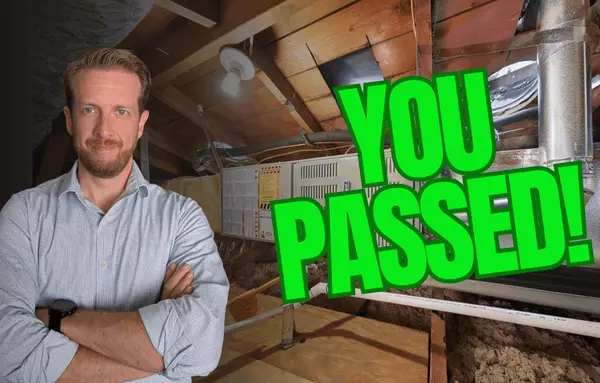The Smart Seller's Guide: 5 Keys to a Successful Sale to a Real Estate Investor
The Smart Seller's Guide: 5 Keys to a Successful Sale to a Real Estate Investor
Three Key Takeaways
- Always thoroughly assess an investor's offer by understanding their potential profit margins and costs (including repairs, holding costs, and selling costs) to gauge their commitment and the deal's viability.
- Actively vet your investor buyer by requesting clear proof of funds, verifying lenders for hard money or DSCR loans, and being cautious of opaque wholesaling arrangements.
- Carefully review and understand all contract contingencies, especially the option period, and leverage a real estate professional's expertise to navigate these complexities and secure a solid, fair sale.

Selling your home can be one of life's most significant financial transactions. While the traditional real estate market involves listing with a realtor and waiting for the perfect buyer, the allure of a quick cash offer from a real estate investor is undeniable. It promises speed and convenience, bypassing showings, repairs, and lengthy negotiations. However, as the A List Team knows from experience, not all investor offers are created equal. We've seen clients in Katy, TX, attempt to sell their property, even moving out, only for the deal to collapse, leaving them in a difficult and unexpected situation.
This guide will unveil five essential aspects you must consider to avoid common pitfalls, ensure you receive the best possible outcome for your property, and navigate the investor landscape as a smart seller.
I. Understanding the "As-Is" Sale and Its Price Impact
When a real estate investor offers to buy your home "as-is," it means they intend to purchase the property in its current condition, relieving you of the burden of repairs, renovations, or even decluttering. This is a significant advantage, particularly if your home is outdated or requires extensive work.
A. Investor's Profit Motives
Investors aren't buying your home to live in it; they're buying it to make a profit. Their primary strategies typically fall into two categories:
- Flipping: This involves renovating the property to increase its value and then reselling it within a short timeframe, usually 3-6 months.
- Renting: The investor acquires the property to generate consistent cash flow from rental income.
The offer price you receive is directly linked to their potential profit margins after all anticipated expenses. If the numbers don't add up for them, the deal is at risk.
B. Analyzing Investor Costs
To truly understand an investor's offer, consider the costs they will incur. Beyond the purchase price, these typically include:
- Repairs and Renovations: The primary investment for a "flip," but even rental properties require upgrades to be market-ready.
- Holding Costs: These include ongoing expenses like utilities, property taxes, and insurance during the period they own the property before resale or renting it out. As seen in the video, overlooking these can significantly impact an investor's profitability.
- Selling Costs (for flips): If they plan to flip, they'll incur additional expenses such as realtor fees (typically 6%), commissions, title insurance, and other closing costs when they eventually sell the property to an end buyer.
If an investor's offer doesn't account for sufficient profit after these expenditures, the likelihood of the deal successfully closing is significantly diminished. An unfeasible deal for the investor often means no deal for you.
C. Property Condition and Financing Alignment
While investors are willing to buy homes in any condition, the extent of necessary repairs can impact their financing options. Properties requiring major structural work, a new roof, or extensive drywall repairs might not qualify for standard rental loans, such as DSCR (Debt Service Coverage Ratio) loans. Banks providing these loans may reject funding for properties deemed uninhabitable or high-risk. Therefore, it's crucial to ensure the investor's intended use (flip vs. rental) and their financing strategy align with your property's actual condition.
II. The Speed and Convenience Investors Can Offer
One of the most appealing aspects of selling to a real estate investor is the promise of a fast and convenient transaction. This can be a lifeline for sellers facing tight deadlines or complex personal situations.
A. Benefits of Selling to an Investor
Selling to an investor often means:
- Reduced Hassle: You avoid the typical fuss of showings and preparing your home for the market. Investors usually don't care about cosmetic appeal, allowing you to sell "as-is."
- Flexibility: Investors may offer flexible terms, like allowing you to leave unwanted items behind or even staying in the property for a brief period after closing.
- Streamlined Process: Many investors, particularly cash buyers, may waive appraisal contingencies because they are confident in the property's underlying value and are willing to take on that risk. This can significantly expedite the closing timeline compared to traditional mortgage financing, which often takes 30-60 days or more. Investors can make cash offers in under 24 hxours and close quickly.
B. Maximizing Convenience
For a smoother process, explore which contingencies the investor is willing to remove from the contract. Removing more contingencies makes the deal more favorable for you as the seller and increases the probability of a swift closing.
III. Vetting Your Investor Buyer and Their Funding
The success of your sale hinges on the legitimacy and financial capability of the investor. Unfortunately, the real estate investment world can have its share of deceptive players. Due diligence on your part is paramount.
A. Importance of Due Diligence
Vetting a real estate investor's proof of funds (POF) is crucial to ensure a legitimate transaction and avoid potential scams. A POF is a document that confirms a buyer has the necessary funds available to complete a real estate purchase, covering costs like the down payment, escrow, and closing costs.
B. Types of Funding and Verification
Always request proof of funds from an investor before signing any purchase agreement. Here’s how to approach different funding scenarios:
- Cash Offers: If the investor claims an all-cash offer, request recent bank statements or a letter from their financial institution proving they have the liquid funds. Do not rely on contact information provided by the investor; independently verify the bank's official contact details to confirm the funds.
- Hard Money Loans: Legitimate investors often use these short-term, high-interest loans for quick closes on investment properties. If a hard money loan is mentioned, call the lender directly to confirm the loan terms and the buyer's approval status. This direct verification helps ensure the loan is secured and the deal will proceed.
- DSCR (Debt Service Coverage Ratio) Loans: These loans are commonly used for rental properties, where the property's projected rental income (after a 20-25% down payment) must cover the debt service. If a DSCR loan is involved, verify with the lender how much rental income is required to approve the loan and confirm that your property's projected rent meets this ratio.
C. Beware of Wholesaling and Assignment of Contracts
A significant red flag to watch for is wholesaling. Some "investors" are actually wholesalers who put a property under contract and then try to sell, or "assign," that contract to another end buyer for a fee, without ever taking ownership themselves.
One major downside is the risk of encountering "wholesale" scams. If the wholesaler cannot find an end buyer, your contract will likely fall through. This can cause significant delays, leaving you with a vacant property and the financial burden of holding costs after you've already moved out, as happened to one of the A List Team's clients in Katy, TX. While not inherently illegal in Texas, transparent communication is key. If an investor mentions wholesaling or contract assignment, press for details on the end buyer, their funding, and verify their ability to close. Be wary if they are not transparent or pressure you into quick decisions.
IV. Understanding the Contract and Contingencies
The purchase agreement is a legally binding document that outlines all the terms and conditions of the sale. Understanding its components, especially contingencies, is paramount to protecting your interests.

A. What are Contingencies?
Contingencies are specific conditions within a purchase agreement that must be met for the contract to become legally binding and the sale to proceed. These clauses act as safeguards for both buyers and sellers, allowing a party to back out of a deal or renegotiate terms if certain conditions are not satisfied. For real estate investors, strategically utilizing contingencies is crucial to mitigate risks and protect their investments from unforeseen issues.
B. Key Contingencies to Review
Common contingencies you'll encounter and must understand include:
- Financing Contingency: Allows the buyer to back out if they cannot secure the necessary loan.
- Home Inspection Contingency: Grants the investor the right to have a professional inspection. If major issues are found, they can negotiate repairs, price adjustments, or terminate.
- Title Contingency: Ensures the property has a clear title, free from liens or other legal issues.
- Option Period: Common in Texas, this period allows the buyer to terminate the contract for almost any reason, often for a small, non-refundable fee. This is the time when investors often conduct their due diligence, including property inspections or getting contractor estimates.
- Assignment Clauses: For wholesalers, this clause allows them to transfer their rights to another buyer. Understand what this means for your sale and the ultimate buyer of your property.
C. Seller's Role During Contingencies
It’s vital to understand how each contingency can impact the sale's certainty and timeline. During the option period, be aware of what the investor is doing (inspections, contractor quotes). This can provide insight into their genuine intent to close. Working with an experienced real estate professional, such as a real estate agent from the A List Team, is vital to navigate these complexities and protect your interests.
V. The Value of Working with a Real Estate Professional
Even if you’re considering an investor offer, don’t underestimate the power of professional guidance. A knowledgeable realtor can be your strongest asset and help get your deal across the finish line.
A. Unlocking Data and Market Knowledge
A professional real estate agent has access to crucial Multiple Listing Service (MLS) data, including past sales prices of comparable homes (After Repair Value - ARV) in your area of Katy, TX. This information is critical for evaluating whether an investor's offer is fair or if you could achieve a better price by listing it conventionally. It helps you understand your property's true market value after repairs, preventing you from leaving money on the table.
B. Expert Vetting and Negotiation
Realtors can help vet investor offers, identifying red flags related to funding irregularities or potential wholesaling arrangements. They are skilled negotiators who can work to remove unfavorable contingencies, secure better terms, and even help structure "win-win" deals. For example, they might negotiate for you to contribute to the investor's lender fees, enabling them to secure a better loan, which in turn could lead to a higher net profit for you.
C. Maximizing Exposure and Options
Listing your property on the MLS through a real estate agent can expose it to a broader pool of buyers, including a wider range of reputable investors, often leading to more competitive offers. A seasoned realtor specializing in investment properties, like those at the A List Team, can connect you with qualified and trustworthy investors in Katy, TX, ensuring you explore all your options for getting the top dollar for your home.

Summary
Selling your home to a real estate investor offers appealing advantages like speed and convenience, particularly for properties needing significant repairs. However, it's a transaction fraught with unique risks, from potentially lower offers to the complexities of investor financing and contract contingencies. A smart seller understands the investor's motivations, rigorously vets their financial capability, scrutinizes every clause in the contract, and, most importantly, leverages the expertise of a seasoned real estate agent. By being informed and working with a professional, you can protect your interests, avoid costly pitfalls, and ensure a successful and profitable sale.
Are you considering selling your home in Katy, TX, and exploring offers from real estate investors? Don't navigate this complex process alone! Contact the A List Team today for a free, no-obligation consultation. Our experienced realtors specialize in both traditional and investment real estate, and we can help you evaluate offers, understand intricate contracts, and ensure you get the top dollar for your property with confidence and peace of mind.
Contact The A List Team Today!Categories
Recent Posts











